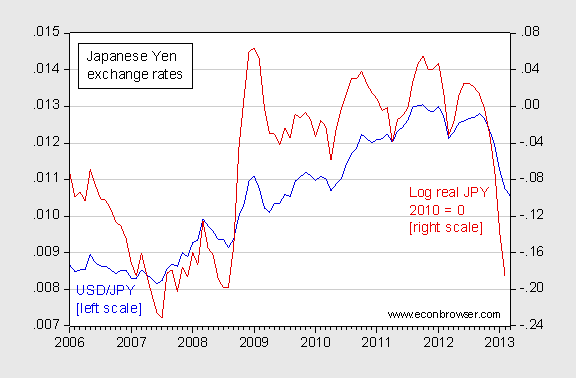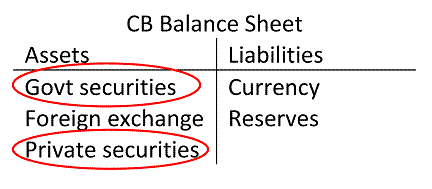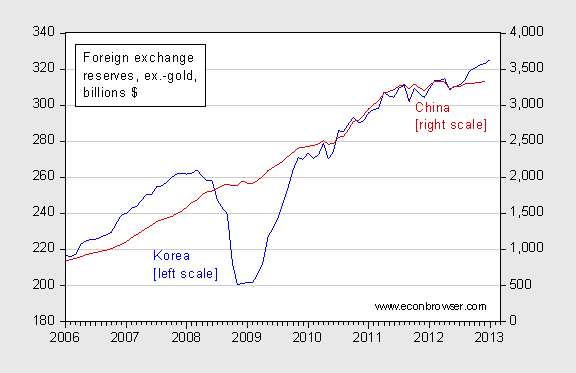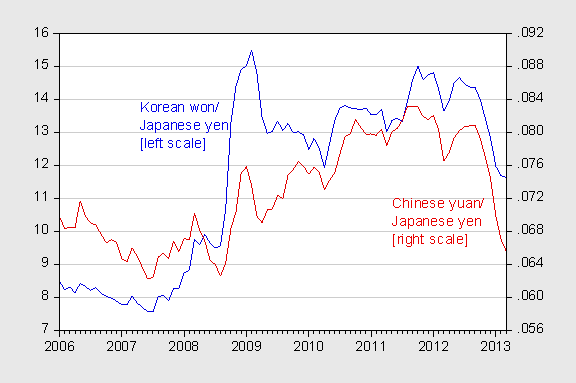From Steven Englander (Citibank), “Currency war, BoJ Style” (4/7, not online):
Japan is likely to be labeled as a currency warrior by major Asian trading partners. However, the new BoJ policy has been endorsed by the Fed and IMF and is very G7 compliant, so the BoJ has cover for its policy agenda, despite the aggressiveness of its balance sheet expansion and negative implications for JPY.
One can see why Japan’s trading partners might be annoyed. The Japanese yen has weakened substantially over the past few months.

Figure 1: USD/JPY, monthly averages (blue, left scale), and log real (trade weighted) Japanese yen (red, right scale). Down denotes a weakening of the yen. Source: St. Louis Fed FRED and BIS.
As is clear from many pronouncements by the Fed, IMF and G-7 (what Englander calls “FIG”), BoJ adoption of unconventional measures such as quantitative easing/credit easing, and extended guidance are not considered currency manipulation by these institutions. From a theoretical standpoint, it’s easy to understand why. Consider the simplified central bank balance sheet.

The BoJ has stated its intent to purchase government securities of longer maturity, and private securities (real estate trusts, etc.) with reserves. Since no purchases of foreign exchange are planned, it is hard to argue that the proposed measures constitutes manipulation in the conventional sense.
The countries with policymakers voicing a concern include China and Korea. [1] [2] Englander notes that for these countries’ policymakers, it’s the outcomes, rather than methods, that matter. Note that in contrast to Japan, China and Korea (and other emerging market economies) are accumulating reserves, more or less.

Figure 2: Korean foreign exchange reserves (blue, left scale) and Chinese foreign exchange reserves (red, right scale), both in billions of dollars. Source: IMF, International Financial Statistics.
To the extent that Korean Chinese reserve accumulation has tailed off while Chinese Korean reserves have continued to rise, I have slightly more sympathy for Korea China’s concerns. Nonetheless, the fact is that Japan is not intervening in foreign exchange markets. The impact on the Japanese exchange rate is a result of the reduction in interest rates at different horizons and along different asset classes, and possibly expectations of higher inflation in the future. (Glick and Leduc, 2013 document the impact of Fed unconventional policy measures on the dollar’s value). China and Korea could offset those effects by intervening more aggressively in foreign exchange markets; of course, this is not a costless proposition. But it isn’t Japan’s obligation to make it easy for other countries to peg their exchange rates.

Figure 3: Korean won/Japanese yen (blue, left scale), and Chinese yuan/Japanese yen (red, right scale). Down denotes a depreciation of the yen. Source: St. Louis Fed FRED and author’s calculations.
I also think that the impact on China, Korea, and the other East Asian economies, is a bit more ambiguous than what many policymakers consider. To the extent that Japanese monetary policy measures finally spur more rapid growth (through depreciation, and through domestic channels of monetary policy), Chinese and Korean economic growth should also rise, somewhat offsetting the negative impact on growth arising from any expenditure switching effects that might occur (I have to wonder how much Chinese and Japanese exports compete in third markets; the less marked this phenomenon, the smaller the expenditure switching from China to Japan). In my next post, I’ll discuss my preliminary estimates of the impact of yen depreciation on Japan’s trade balance (paper here), using conventional measures of the real effective exchange rate (discussion of REER measures accounting for vertical integration in this paper by Bems and Johnson).
Further, as I noted in a previous post, the longer term impact on the exchange rate might be quite different from the short term as income rises.
In sum monetary expansion in Japan, where output is arguably below full employment levels, does not mean we have a zero-sum outcome. Appreciation of the partner country currencies – particularly those of other emerging markets experiencing inflationary pressures – should lead to a beneficial re-allocation of aggregate demand.
Keene & Eisen/Bloomberg interview of Englander here.
Update, 4/9, 9am Pacific: For a more extensive discussion of intervention vs. spillovers, see this paper by Richard Portes. Fed Chairman Bernanke’s interpretation is examined in this post. And Greg Ip/Free Exchange‘s view through the lens of the 1930’s.
Econbrowser post raised the question « Should economists be philosophers as well » One has,as many choices of philosophers than economists have in theories. Hereafter is just reading, the thinking process is not required
Econbrowser
« BoJ adoption of unconventional measures such as quantitative easing/credit easing, and extended guidance are not considered currency manipulation by these institutions »
Bloomberg
« BOJ defeats Basci cut as lira carry trade revives Turkey credit Bloomberg »
« Turkish central bank Governor Erdem Basci’s efforts to weaken the lira are being undermined by stimulus from his counterpart in Japan as investors buy the Mediterranean nation’s assets in carry trades funded by the yen »
Bloomberg
The International Monetary Fund endorsed nations’ use of capital controls in certain circumstances, making official a shift, which has been in the works for three years, that will guide the fund’s advice.
In a reversal of its historic support for unrestricted flows of money across borders, the Washington-based IMF said controls can be useful when countries have little room for economic policies such as lowering interest rates or when surging capital inflows threaten financial stability. Still, it said the measures should be targeted, temporary and not discriminate between residents and non-residents
Bloomberg
Bernanke Says Fed to Press Banks to Curb Liquidity Risk
« He also said that expansionary monetary policies in the world’s largest economies are “mutually constructive »
Yen vs. US Trade-Weighted Broad Index:
http://research.stlouisfed.org/fredgraph.png?g=hlG
http://research.stlouisfed.org/fredgraph.png?g=hlI
http://research.stlouisfed.org/fredgraph.png?g=hlJ
http://research.stlouisfed.org/fredgraph.png?g=hlK
http://research.stlouisfed.org/fredgraph.png?g=hlL
http://research.stlouisfed.org/fredgraph.png?g=hlM
A cheaper Yen falling to par against the US$ Broad Index will not help Japan’s net trade balance and encourage domestic production and exports this time because of rising energy import costs creating a permanent structural drag along with demographics:
http://research.stlouisfed.org/fredgraph.png?g=hlN
http://research.stlouisfed.org/fredgraph.png?g=hlO
From a global macroeconomic perspective, the maturation of global integration of production/supply chains and markets, regional GDP PPP, relative parity of trade and capital flows between regions, and decelerating growth of trade and real GDP per capita implies the major currencies trending towards par with one another and fiat digital debt-money currency intervention by central banks achieving diminishing to no returns hereafter.
I’m totally in agreement. Every nation should have the right to control its own domestic monetary policy. It’s rich for China and Korea, the worst of the beggar-thy-neighbor currency manipulators, to complain about Japan doing something about its demand shortfall.
In general, when countries cut interest rates domestically, to the extent their economy recovers, their trade balance actually worsens. (This may not be clear in the data because central banks cut rates when the economy is doing poorly…) Japanese imports may not be that investment-heavy, but still I would expect a positive impact.
Beware your estimation technique Menzie! The proper way to do this is to estimate the impact of the monetary policy switch on GDP, and then the impact of the GDP change on the trade balance. Both are tough.
Bernanke on whether QE is “beggar-thy-neighbor”:
“To the contrary, because monetary policy is accommodative in the great majority of advanced industrial economies, one would not expect large and persistent changes in the configuration of exchange rates among these countries. The benefits of monetary accommodation in the advanced economies are not created in any significant way by changes in exchange rates; they come instead from the support for domestic aggregate demand in each country or region.”
The relative size of the benefits of exchange rate depreciation depend on the size of the economy’s foreign sector, not the level of development. And it is the size of the economies involved, not the number, that matter. Regardless of what one would “expect,” the effect on the dollar-euro exchange rate has been marked. To say the euro area has not been hurt by this effect (which is magnified by China’s dollar peg and Japan following our example), seems to me highly questionable. For example, after this change, Europe displaced the U.S. as China’s biggest export market. Ben has made equally questionable arguments before – recall his truly outrageous claims about the size of the gains from international trade (see Dani Rodrick’s comments). His arguments here are about as bad as the awkward writing used to display them. True, QE did more than merely help the trade balance; it has caused asset values to balloon, with salutary effects on demand. But to claim that other countries are net beneficiaries of the policy are questionable at best. Certainly, a good number of foreign finance ministers have disagreed.